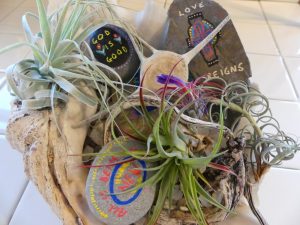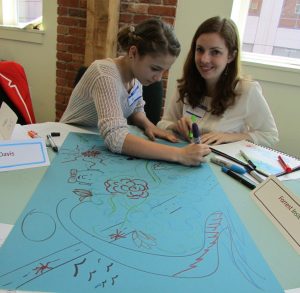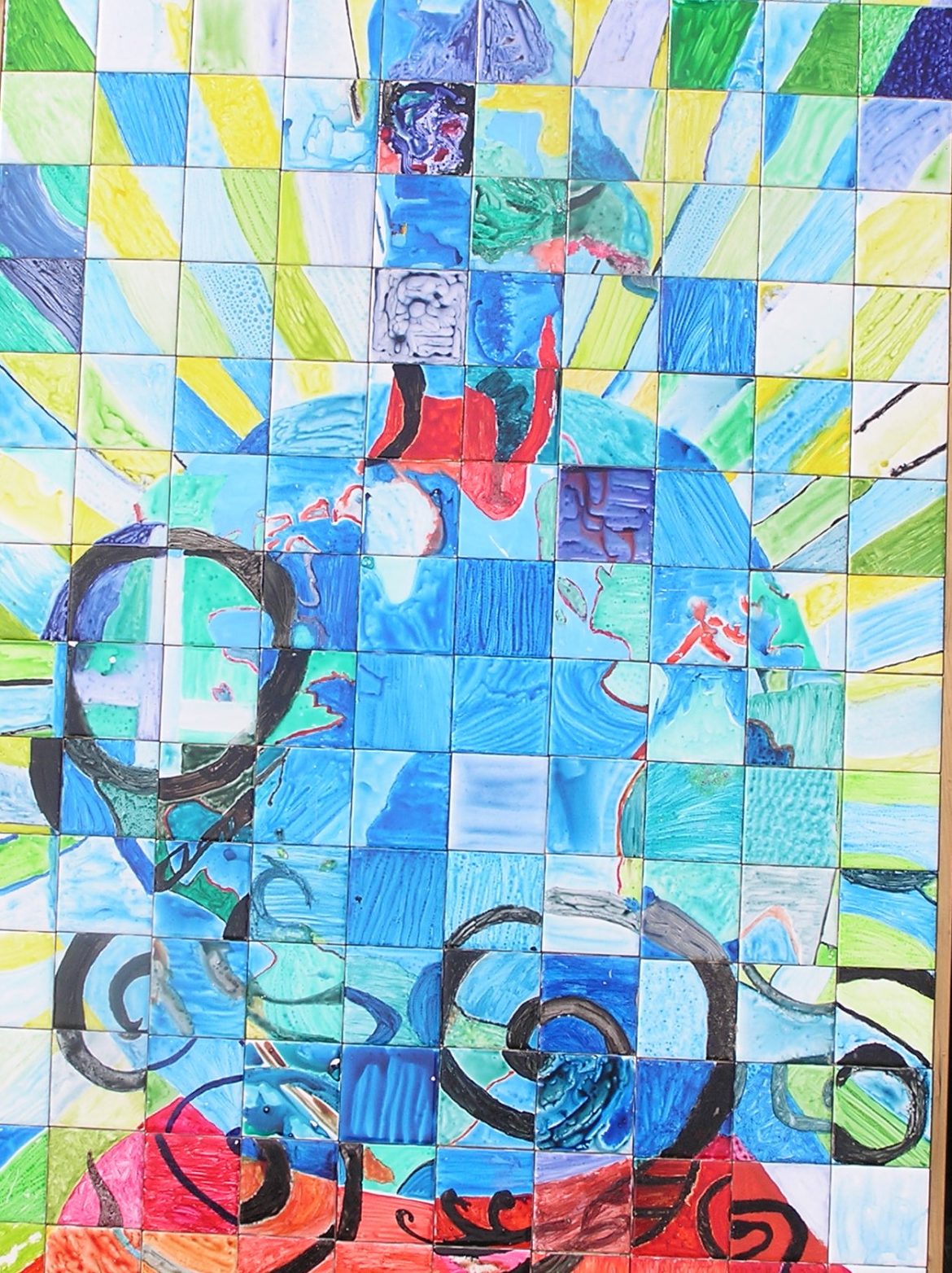Early this month when we asked for ideas on on creative prayer posts, one person suggested how to foster creativity in kids. Today’s meditation began as that post, but then I realized that we all need this kind of help.
In her book Walking on Water: Reflections on Faith and Art, Madelaine L’Engle reminds us that we are all born artists endowed with rich unfettered imaginations. Our senses are in touch with being rather than doing. As we grow, she believes, we are corrupted by the dirty devices of the secular world where myth and fairy tale must be discarded. The vivid purple clouds and yellow skies of childhood give way to the real world of white clouds and blue skies. Leaves are made of molecules and atoms, rainbows are caused by refraction of light. Life is pigeon holed into a rational scientific understanding of the world, in which God if God exists at all can also be confined to a small box of life that we open on Sunday or for a few moments each morning.
Madeleine goes on to say,
We write, we make music, we draw pictures because we are listening for meaning, feeling for healing And during the writing of the story, or the painting, or the composing or singing or playing, we are returned to that open creativity which was ours when we were children. We cannot be mature artists if we have lost the ability to believe which we had as children. An artist at work is in a condition of complete and total faith.” (Walking on Water p181)
Surely this is part of what it Jesus means in Matthew 18:3 when he tells us we must become like little children. To enter God’s and embrace God’s worldview we must learn to be creative again and see as children see, breaking away from the dirty devices of the secular world and discovering the awe and wonder of God’s dreams and promises for the future.
So today’s post is about how to stir creativity in all of us to return to that childlike wonder. Here are some suggestions that I have found helpful in this process:
1. Give people time to be creative without interfering. Many sites on fostering creativity in kids suggest unstructured imaginative play –unencumbered by adult direction, and not dependent on a lot of commercial stuff. Adults too need this kind of stimulation to foster creativity. Making a mess, getting dirty, colouring, playing sports, are all rejuvenating practices that free us from inflexible thought patterns and routines.
In our hectic lives, many of us focus so heavily on work and family commitments that we never have time for pure fun. Just because we’re adults, doesn’t mean we have to take ourselves so seriously and make life all about work. Maybe we even need to hand some of the planning over to our kids. I wonder what kids would suggest if rather than telling them to make an Advent wreath we asked them to come up with a new to celebrate Advent and Christmas and made sure they had plenty of time to do that.
The trick, John Cleese says, is in making the space to engage in childlike play without relying on childish spontaneity—he recommends scheduling time to be creative, giving oneself a “starting time and a finish time” and thereby setting “boundaries of space, boundaries of time.”
2. Give people permission to fail & reward failure. So much of our activity is designed for success. Failure is something we teach people consciously or unconsciously, to be afraid of.
“There is no such thing as failure — failure is just life trying to move us in another direction,” Oprah counseled new Harvard graduates. Creativity often flows out of so called failure. Jesus seeming failure – death on the Cross was actually his greatest success.
Over the next few weeks finish the day by asking yourself, your friends or your family: What mistakes did you make today? Then share your own failures, laugh about them together. Have some fun. Now look back over the “failures” of your life. What creative impulses did they stir? What new directions or new ministries did they give birth too? Plan a party to celebrate these.
3. Give people freedom and space to make a mess and be willing to get messy with them. “Cleanliness is next to godliness” is not a biblical verse. That might come as a huge shock to some of us and I know that messiness can be a challenge for some, but maybe tidiness is something we all need to let go of for a season so that we can find the freedom of expression God desires for us. Evidently sitting in a messy room makes us more creative. Maybe playing paintball, making mud pies and preparing a very messy meal are creative acts that have an important purpose that we have not yet recognized.
4. Let your colleagues and congregations imagine their own story – don’t be bossy and imagine the story for them. Read one of Jesus parables and let your congregation write or draw, whatever interested them that they remembered, rather than giving them specific details from the reading that someone else found important. Consider taking the season of Lent next year to go through several stories about Jesus ending during Holy week with the stories of Jesus walk to Jerusalem and the crucifixion. Ask congregation to imagine games, and activities to go with each of the stories. It will give new life to their faith and new understanding of who Jesus is.

5. Encourage people to create sacred spaces. As many of you know my office desk has become a sacred space for me and I love to create new contemplative gardens that can draw my attention throughout the day and invite me to pause and reenter the presence of God. They have become wonderful nourishment for my soul and their themes remind me of the work God is doing in my life.
We all benefit from sacred spaces created out of the issues we are grappling with. Sit for a few minutes and imagine what your own scared space could look like. What music would you include, what fragrances – maybe some incense or other aromas, what visual cues? I think you will be amazed at the creativity that emerges and the strengthening of your faith it encourages.
6. Answer Questions with Questions. Emphasize process rather than product. One way you can do this is by asking questions about the process – Did you have fun? Are you finished? What did you like about that activity?
Jesus often asked questions rather than giving answers. Questions invite active responses. They give us permission us to think, imagine and come up with our own creative solutions.

7. Celebrate innovation and creativity. Cover your walls with art and other evidence of creative expression. I love churches that have artists painting during the service and then post them around the church or encourage sharing of stories, music and other creative expressions. It stirs all of us to think more creatively and imaginatively about our faith. Embracing new technologies, new forms of artistic expression, new possibilities for spiritual practices enables all of us to grow in our faith to find change exciting, not over-whelming or intimidating.
8. Give people the opportunity and the permission to express “divergent thought.” Encourage your friends and colleagues to disagree with you, to engage in constructive arguments. Encourage them to find more than one route to a solution, and more than one solution to a problem. When we think there is only one way to pray, to read the bible or to express our faith we become rigid and eventually our faith stagnates and we cease to grow.
9. Teach people skills like cooking, gardening, knitting, carving wood, painting. I love to cook and have done so since I was very young, but my mother was stick to the recipe type of person. It was only when I married Tom and watched him take a recipe and depart from it with his own unique, creative flair that I started to branch out and experiment myself. Some of my favourite recipes have sprung from the creative expression.
We love to watch others creating but it is even more inspiring to engage in these creative acts ourselves and then give them our own signature.
10. Never stop learning. Natural curiosity and creativity go hand-in-hand. Part of what the internet has taught us is that the world is a big, complicated place and there’s always something new and exciting to explore. Maybe you want to pick up a new language, master a new skill or explore a new creative prayer practice. The more things you know, the more you’ll have to draw on whenever you’re trying to solve a task or grappling with your faith. The more research you do, the better you’ll understand the process of discovery.
Creativity is at the core of who God is and wants us to be. I hope that you will take some time to explore these tools for creativity and draw closer to God in the process.

